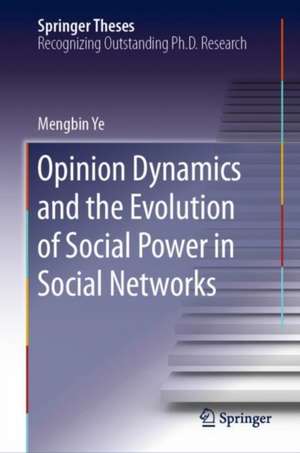Opinion Dynamics and the Evolution of Social Power in Social Networks: Springer Theses
Autor Mengbin Yeen Limba Engleză Hardback – mar 2019
Din seria Springer Theses
- 18%
 Preț: 997.88 lei
Preț: 997.88 lei -
 Preț: 389.88 lei
Preț: 389.88 lei - 15%
 Preț: 646.94 lei
Preț: 646.94 lei - 18%
 Preț: 943.43 lei
Preț: 943.43 lei -
 Preț: 399.29 lei
Preț: 399.29 lei - 18%
 Preț: 944.99 lei
Preț: 944.99 lei - 15%
 Preț: 636.80 lei
Preț: 636.80 lei - 18%
 Preț: 941.05 lei
Preț: 941.05 lei - 15%
 Preț: 643.16 lei
Preț: 643.16 lei - 15%
 Preț: 642.68 lei
Preț: 642.68 lei - 18%
 Preț: 1103.62 lei
Preț: 1103.62 lei - 20%
 Preț: 558.83 lei
Preț: 558.83 lei - 18%
 Preț: 1112.30 lei
Preț: 1112.30 lei - 18%
 Preț: 944.19 lei
Preț: 944.19 lei - 18%
 Preț: 1109.92 lei
Preț: 1109.92 lei - 18%
 Preț: 1217.27 lei
Preț: 1217.27 lei - 15%
 Preț: 640.06 lei
Preț: 640.06 lei - 15%
 Preț: 636.45 lei
Preț: 636.45 lei - 15%
 Preț: 640.06 lei
Preț: 640.06 lei - 15%
 Preț: 640.88 lei
Preț: 640.88 lei -
 Preț: 389.70 lei
Preț: 389.70 lei - 20%
 Preț: 563.91 lei
Preț: 563.91 lei -
 Preț: 393.35 lei
Preț: 393.35 lei - 15%
 Preț: 637.93 lei
Preț: 637.93 lei - 15%
 Preț: 641.85 lei
Preț: 641.85 lei - 18%
 Preț: 1225.94 lei
Preț: 1225.94 lei - 20%
 Preț: 551.36 lei
Preț: 551.36 lei - 18%
 Preț: 1229.10 lei
Preț: 1229.10 lei - 15%
 Preț: 639.25 lei
Preț: 639.25 lei - 18%
 Preț: 999.45 lei
Preț: 999.45 lei - 15%
 Preț: 640.06 lei
Preț: 640.06 lei - 18%
 Preț: 1220.45 lei
Preț: 1220.45 lei - 18%
 Preț: 1116.26 lei
Preț: 1116.26 lei - 18%
 Preț: 1110.72 lei
Preț: 1110.72 lei - 18%
 Preț: 1000.87 lei
Preț: 1000.87 lei - 18%
 Preț: 891.17 lei
Preț: 891.17 lei - 15%
 Preț: 640.06 lei
Preț: 640.06 lei - 5%
 Preț: 1154.07 lei
Preț: 1154.07 lei - 15%
 Preț: 635.96 lei
Preț: 635.96 lei - 15%
 Preț: 640.88 lei
Preț: 640.88 lei -
 Preț: 387.20 lei
Preț: 387.20 lei - 18%
 Preț: 1109.92 lei
Preț: 1109.92 lei -
 Preț: 385.25 lei
Preț: 385.25 lei -
 Preț: 385.25 lei
Preț: 385.25 lei - 18%
 Preț: 1112.30 lei
Preț: 1112.30 lei - 18%
 Preț: 999.45 lei
Preț: 999.45 lei -
 Preț: 386.99 lei
Preț: 386.99 lei - 15%
 Preț: 637.13 lei
Preț: 637.13 lei - 20%
 Preț: 554.21 lei
Preț: 554.21 lei - 20%
 Preț: 555.59 lei
Preț: 555.59 lei
Preț: 643.65 lei
Preț vechi: 757.24 lei
-15% Nou
Puncte Express: 965
Preț estimativ în valută:
123.16€ • 128.60$ • 101.70£
123.16€ • 128.60$ • 101.70£
Carte tipărită la comandă
Livrare economică 15-29 aprilie
Preluare comenzi: 021 569.72.76
Specificații
ISBN-13: 9783030106058
ISBN-10: 3030106055
Pagini: 240
Ilustrații: XXIII, 209 p. 53 illus., 51 illus. in color.
Dimensiuni: 155 x 235 mm
Greutate: 0.51 kg
Ediția:1st ed. 2019
Editura: Springer International Publishing
Colecția Springer
Seria Springer Theses
Locul publicării:Cham, Switzerland
ISBN-10: 3030106055
Pagini: 240
Ilustrații: XXIII, 209 p. 53 illus., 51 illus. in color.
Dimensiuni: 155 x 235 mm
Greutate: 0.51 kg
Ediția:1st ed. 2019
Editura: Springer International Publishing
Colecția Springer
Seria Springer Theses
Locul publicării:Cham, Switzerland
Cuprins
Introduction.- Preliminaries.- A Novel Model for Opinion Dynamics Under Pressure to Conform.- The EPO Model’s Connections with Social Psychology Concepts.- Evolution of Social Power in Networks with Constant Topology.- Dynamic Social Networks: Exponential Forgetting of Perceived Social Power.- Modification of Social Dominance in Autocratic Networks.- Nonlinear Mapping Convergence and Application to Social Power Analysis.- Continuous-Time Opinion Dynamics with Interdependent Topics.- Conclusions and Future Work.
Textul de pe ultima copertă
This book uses rigorous mathematical analysis to advance opinion dynamics models for social networks in three major directions. First, a novel model is proposed to capture how a discrepancy between an individual’s private and expressed opinions can develop due to social pressures that arise in group situations or through extremists deliberately shaping public opinion. Detailed theoretical analysis of the final opinion distribution is followed by use of the model to study Asch’s seminal experiments on conformity, and the phenomenon of pluralistic ignorance. Second, the DeGroot-Friedkin model for evolution of an individual’s social power (self-confidence) is developed in a number of directions. The key result establishes that an individual’s initial social power is forgotten exponentially fast, even when the network changes over time; eventually, an individual’s social power depends only on the (changing) network structure. Last, a model for the simultaneous discussion of multiple logically interdependent topics is proposed. To ensure that a consensus across the opinions of all individuals is achieved, it turns out that the interpersonal interactions must be weaker than an individual’s introspective cognitive process for establishing logical consistency among the topics. Otherwise, the individual may experience cognitive overload and the opinion system becomes unstable. Conclusions of interest to control engineers, social scientists, and researchers from other relevant disciplines are discussed throughout the thesis with support from both social science and control literature.
Caracteristici
Nominated as an outstanding PhD thesis by The Australian National University, Canberra, Australia Advances the modeling and understanding of how individuals’ opinions evolve in a social network Accessible for an inter-disciplinary audience of social scientists and engineers
